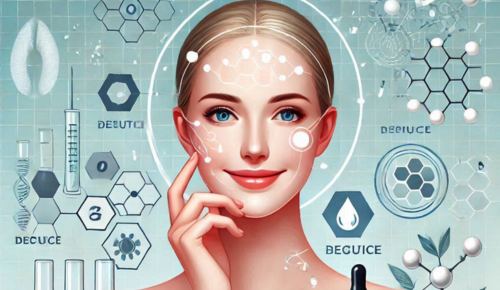The Science Behind Peptides in Skincare

skincare products
Peptides have become a buzzword in the skincare industry, but what exactly are they, and why are they so important for your skin? These small but mighty molecules play a critical role in maintaining healthy, youthful skin. Let’s dive into the science behind peptides and explore how they can benefit your skincare routine.
What Are Peptides?
Peptides are short chains of amino acids that act as the building blocks of proteins, such as collagen, elastin, and keratin, which are essential for the skin’s structure and resilience. When applied topically through skincare products, peptides can signal the skin to repair itself, boost collagen production, and improve overall texture and tone.
How Do Peptides Work in Skincare?
As we age, the natural production of collagen and elastin decreases, leading to wrinkles, sagging, and loss of firmness. Peptides work by mimicking the skin’s natural communication processes, triggering the skin to produce more collagen and repair damage. They penetrate the outer layer of the skin and send signals to cells, effectively stimulating regeneration and rejuvenation.
Key Benefits of Peptides
- Boost Collagen Production:
- Peptides stimulate collagen synthesis, helping to firm the skin and reduce the appearance of fine lines and wrinkles.
Improve Skin Barrier Function:
- Some peptides enhance the skin’s natural barrier, protecting it from environmental stressors and retaining moisture.
Reduce Inflammation:
- Peptides have anti-inflammatory properties that soothe redness and irritation, making them suitable for sensitive or acne-prone skin.
Enhance Elasticity:
- By promoting elastin production, peptides help maintain skin’s bounce and resilience.
Even Skin Tone:
- Certain peptides can reduce hyperpigmentation, leaving the skin looking brighter and more even.
Types of Peptides Used in Skincare
There are several types of peptides, each offering unique benefits for the skin:
- Signal Peptides: Stimulate collagen and elastin production to reduce signs of aging.
- Carrier Peptides: Deliver trace elements like copper to the skin, aiding in wound healing and regeneration.
- Enzyme Inhibitor Peptides: Prevent the breakdown of collagen and elastin, preserving skin’s firmness.
- Neurotransmitter-Inhibiting Peptides: Relax facial muscles, mimicking the effects of Botox to reduce expression lines.
How to Incorporate Peptides Into Your Routine
- Choose the Right Products:
- Look for serums, creams, or eye treatments that highlight peptides as a key ingredient. Peptides often work well with hyaluronic acid for hydration.
Layer Correctly:
- Apply peptide-rich products after cleansing and toning but before heavier creams or oils. This ensures maximum absorption.
Pair with Complementary Ingredients:
- Peptides are versatile and pair well with ingredients like antioxidants, niacinamide, and ceramides.
Be Patient:
- Consistent use is key. It may take a few weeks to see visible improvements in your skin’s texture and tone.
Common Myths About Peptides
- Myth: Peptides can replace retinol or vitamin C.
- Truth: While peptides are powerful, they work best when combined with other active ingredients in a balanced skincare routine.
- Myth: All peptides are the same.
- Truth: Different types of peptides target specific skin concerns, so it’s essential to choose the right one for your needs.
Are Peptides Safe?
Peptides are generally well-tolerated by all skin types and are less likely to cause irritation compared to other actives like retinol. However, it’s always a good idea to perform a patch test before introducing a new product to your routine.
Peptides are a game-changer in modern skincare, offering a science-backed approach to combat aging and improve skin health. By incorporating peptide-based products into your routine, you can enjoy firmer, smoother, and more radiant skin. Embrace the power of peptides and let them work their magic to reveal your skin’s full potential. Use quality cosmetics, creams with retinol and perfumes like Montage Intense.



